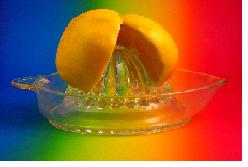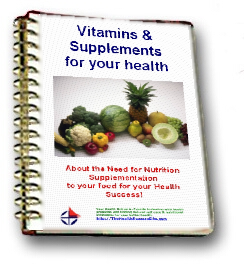|
What are vitamins?
With each day more people are turning to herbs and vitamin
supplements to ease their pain and/or enhance their overall health. People are taking control over their own health and we're telling the medical profession that they are NOT the only answer. We are pressuring our doctors to become more enlightened and to educate themselves on natural alternatives. What Are Vitamins and When Should We Take Them? No person is too young or old to benefit from vitamins but whether there’s a need for taking vitamin supplements mostly depends on a persons health condition rather than his age. What are Vitamins?

What Functions Do Vitamins Perform? Vitamins And Your Health
These days, we all know that taking vitamins is an easy way to start pursuing a healthy and disease free way of life. In the past, vitamins were used with diets, although they weren’t near as sophisticated as they are today. The vitamins of today are far more sophisticated and geared towards certain aspects of your body and your health. Even though some people may not realize it, food doesn’t give you all of the vitamins and nutrients your body needs. Although you may be following a healthy diet, you won’t receive everything your body needs to carry out daily functions. You can buy high quality food if you wish, although it isn’t the preferred way to fix this type of situation. No matter what you choose to eat, you still won’t get the vitamins and nutrients you need. If you have any type of restrictions with your diet, it can be even more difficult to get the vitamins and nutrients you need. Those who suffer from food allergies especially, find it even harder to get the right amount of vitamins. Even if you have a small appetite, you can be at a major disadvantage to getting everything your body needs. Smaller appetites get full a lot quicker, making it harder to eat the foods you need on a daily basis. No matter how you look at it, you won’t get everything your body needs from food. To get the vitamins, minerals, and nutrients you need, you’ll need to use supplements and vitamins. Vitamin supplements are the easiest way to give your body what it needs. You can use vitamins and supplements in your normal diet, although you’ll need to choose them accordingly with what you need and what your diet consists of. Even though there are many vitamins that you can benefit from, one of the most important is B12, which can raise your energy levels and help with your immune system. Some other vitamins you’ll need to include in your normal diet are vitamin A, C, D, and E. These vitamins are very important to your body, as they help with many different functions. Vitamins C and E are among the most important, as they help with your skin, hair growth, and the way your body functions. To ensure that your body remains at it’s best, you should make sure that you get the right amount of vitamins with your diet. You can find vitamin supplements locally or on the Internet, with hundreds to choose from. You should also include selenium and colostrum in your daily diet as well, as these two vitamins will help you with your health. If you take the right vitamins with your diet - you’ll find that your health and energy will always will remain at their top levels of performance.
Types of vitamins
What are some Natural Vitamin Sources? There are a lot of people who do not have enough natural vitamin sources in their diet and therefore suffer from a deficiency of one or more vitamins. Obviously, it is possible to buy vitamin supplements to help overcome any deficiencies but for the majority of people it should be possible for them to obtain the majority of their recommended daily allowance of vitamins from natural vitamin sources. The key to gaining the correct amount of vitamins from natural vitamin sources is to eat a healthy and balanced diet. There are certain diets, such as vegetarian, that provide a limited number of natural vitamin supplements and therefore a supplement may be necessary. Also, the intake required of these natural vitamin sources at certain periods may need to be increased and a supplement may be the best option. It is important to be aware of each of the different types of vitamins and their best natural vitamin sources so that a person can incorporate as many of these as possible into their regular diet. Water soluble vitamins cannot be stored in the body and need to be replenished on a daily basis so it is natural vitamin sources for these vitamins that are the most essential to know. • Natural vitamin B1 sources are brewer’s yeast, whole grains, blackstrap molasses, brown rice, organ meats, egg yolk • Natural vitamin B2 sources are brewer’s yeast, whole grains, legumes, nuts, organ meats, blackstrap molasses • Natural vitamin B3 sources are lean meats, poultry & fish, brewer’s yeast, peanuts, milk, rice bran, potatoes • Natural vitamin B4 sources are egg yolks, organ meats, brewer’s yeast, wheat germ, soybeans, fish, legumes • Natural vitamin B5 sources are organ meats, egg yolks, legumes, whole grains, wheat germ, salmon, brewer’s yeast • Natural vitamin B6 sources are meats, whole grains, organ meats brewer’s yeast, blackstrap molasses, wheat germ • Natural vitamin B7 sources are egg yolks, liver, unpolished rice, brewer’s yeast, sardines, legumes, whole grains • Natural vitamin B8 sources are who1e grains, citrus fruits, molasses, meat, milk, nuts, vegetables, brewer’s yeast • Natural vitamin B9 sources are dark-green leafy vegetables, organ meats, root vegetables, oysters, salmon, milk • Natural vitamin B12 sources are organ meats, fish, pork, eggs, cheese, milk, lamb, bananas, kelp, peanuts • Natural vitamin B13 sources are root vegetables, liquid whey • Natural vitamin B15 sources are brewer’s yeast, rare steaks, brown rice, sunflower, pumpkin & sesame seeds • Natural vitamin B17 sources are whole kernels of apricots, apples, cherries, peaches, plums • Natural vitamin C sources are citrus, cabbage family, chilli peppers, berries, melons, asparagus, rose hips
Which are the Vitamins with Side Effects?
All vitamins are generally beneficial to health. But there are kinds of vitamins that when administered in large doses will cause some side effects and even diseases. As a rule of thumb, both the deficiency and the excessive intake of vitamins are harmful. It is then important that only the right amount of these nutrients is administered to the body. Vitamin A is believed to be the most toxic vitamin of all, if consumed inappropriately. If more than 25,000 IU of Vitamin A is taken in a day, you will experience loss of appetite and visible reduction of weight. There would also be notable bone malformations, internal bleedings, spontaneous fractures, and even liver toxicities. Pregnant mothers who have too much Vitamin A in their system are likely to deliver their babies with a particular birth defect. The known side effect of too much Vitamin C would be gastrointestinal distress and diarrhea. Hyperacidity and other stomach-related problems are common too. Those who have history of having stones in their kidneys are advised to consult with a doctor before taking any Vitamin C. Vitamin E, even with their good oxidation properties, has harmful side effects too. Anything higher than 1,000 milligrams of Vitamin E in the body will interfere with normal blood clotting. And if this much is taken on a daily basis, nausea, fatigue, muscle weakness, and diarrhea can be expected. Vitamin D has a potential to be as toxic as Vitamin A. The most damaging side effect it causes would be bone lesions. Those who have taken too much Vitamin D, even if it they did on at a single time would surely experience the toxicities associated with Vitamin D. Vitamin B has different types. Of them all, Vitamin B-6 and Vitamin B-12 are the ones that may just have some prominent side effects. Vitamin B-6 is believed to cause reversible neuropathy if more than 500 milligrams are taken each day, for a prolonged period of time. Note that the RDA for this vitamin is only 2 milligrams per day. Vitamin B-12, on the other hand, is the vitamin that is known to trigger allergic reactions when taken in relatively high doses.
24 Good reasons why you may need vitamin supplements: 1. Poor Digestion Even when your food intake is good, inefficient digestion can limit your body’s uptake of vitamins. Some common causes of inefficient digestion are not chewing well enough and eating too fast. Both of these result in larger than normal food particle size, too large to allow complete action of digestive enzymes. Many people with dentures are unable to chew as efficiently as those with a full set of original teeth.

2. Hot Coffee, Tea and Spices Habitual drinking of liquids that are too hot, or consuming an excess of irritants such as coffee, tea or pickles and spices can cause inflammation of the digestive linings, resulting in a drop in secretion of digestive fluids and poorer extraction of vitamins and minerals from food. 3. Alcohol Drinking too much alcohol is known to damage the liver and pancreas which are vital to digestion and metabolism. It can also damage the lining of the intestinal tract and adversely affect the absorption of nutrients, leading to sub-clinical malnutrition. Regular heavy use of alcohol increases the body’s need for the B-group vitamins, particularly thiamine, niacin, pyridoxine, folic acid and vitamins B12, A and C as well as the minerals zinc, magnesium and calcium. Alcohol affects availability, absorption and metabolism of nutrients. 4. Smoking Smoking too much tobacco is also an irritant to the digestive tract and increases the metabolic requirements of Vitamin C, all else being equal, by at least 30mg per cigarette over and above the typical requirements of a non-smoker. Vitamin C which is normally present in such foods as paw paws, oranges and capsicums, oxidizes rapidly once these fruits are cut, juiced, cooked or stored in direct sunlight or near heat. Vitamin C is important to the immune function.
5. Laxatives Overuse of laxatives can result in poor absorption of vitamins and minerals from food, by hastening the intestinal transit time. Paraffin and other mineral oils increase losses of fat soluble vitamins A, E and K. Other laxatives used to excess can cause large losses of minerals such as potassium, sodium and magnesium. 6. Fad Diets Bizarre diets that miss out on whole groups of foods can be seriously lacking in vitamins. Even the popular low fat diets, if taken to an extreme, can be deficient in vitamins A, D and E. Vegetarian diets, which can exclude meat and other animal sources, must be very skillfully planned to avoid vitamin B12 deficiency, which may lead to anemia. 7. Overcooking Lengthy cooking or reheating of meat and vegetables can oxidize and destroy heat susceptible vitamins such as the B-group, C and E. Boiling vegetables leaches the water soluble vitamins B-group and C as well as many minerals. Light steaming is preferable. Some vitamins, such as vitamin B6 can be destroyed by irradiation from microwaves. 8. Food Processing Freezing food containing vitamin E can significantly reduce its levels once defrosted. Foods containing vitamin E exposed to heat and air can turn rancid. Many common sources of vitamin E, such as bread and oils are nowadays highly processed, so that the vitamin E content is significantly reduced or missing totally, which increases storage life but can lower nutrient levels. Vitamin E is an antioxidant which defensively inhibits oxidative damage to all tissues. Other vitamin losses from food processing include vitamin B1 and C. 9. Convenience Foods A diet overly dependent on highly refined carbohydrates, such as sugar, white flour and white rice, places greater demand on additional sources of B-group vitamins to process these carbohydrates. An unbalanced diet contributes to such conditions as irritability, lethargy and sleep disorders. 10. Antibiotics Some antibiotics although valuable in fighting infection, also kill off friendly bacteria in the gut, which would normally be producing B-group vitamins to be absorbed through the intestinal walls. Such deficiencies can result in a variety of nervous conditions, therefore it may be advisable to supplement with B-group vitamins when on a lengthy course of broad spectrum antibiotics. 11. Food Allergies The omission of whole food groups from the diet, as in the case of individuals allergic to gluten or lactose, can mean the loss of significant dietary sources of nutrients such as thiamine, riboflavin or calcium. 12. Crop Nutrient Losses Some agricultural soils are deficient in trace elements. Decades of intensive agriculture can overwork and deplete soils, unless all the soil nutrients, including trace elements, are regularly replaced. This means that food crops can be depleted of nutrients due to poor soil management. In one U.S Government survey, levels of essential minerals in crops were found to have declined by up to 68 per cent over a four year period in the 1970’s. 13. Accidents and Illness Burns lead to a loss of protein and essential trace nutrients such as vitamins and minerals. Surgery increases the need for zinc, vitamin E and other nutrients involved in the cellular repair mechanism. The repair of broken bones will be retarded by an inadequate supply of calcium and vitamin C and conversely enhanced by a full dietary supply. The challenge of infection places high demand on the nutritional resources of zinc, magnesium and vitamins B5, B6 and zinc. 14. Stress
15. P.M.T Research has demonstrated that up to 60 per cent of women suffering from symptoms of premenstrual tension, such as headaches, irritability, bloated ness, breast tenderness, lethargy and depression can benefit from supplementation with vitamin B6. 16. Teenagers Rapid growth spurts such as in the teenage years, particularly in girls, place high demands on nutritional resources to underwrite the accelerated physical, biochemical and emotional development in this age group. Data from the USA Ten State Nutrition Survey (in 1968-70 covering a total of 24,000 families and 86,000 individuals) showed that between 30-50 per cent of adolescents aged 12-16 had dietary intakes below two thirds of the recommended daily averages for Vitamin A, C, calcium and iron. 17. Pregnant Women Pregnancy creates higher than average demands for nutrients, to ensure healthy growth of the baby and comfortable confinement for the mother. Nutrients which typically require increase during pregnancy are the B-group, especially B1, B2, B3, B6, folic acid and B12, A, D, E and the minerals calcium, iron, magnesium, zinc and phosphorous.
The Ten State Nutrition Survey in the USA in 1968-70 showed that as many as 80 per cent of the pregnant women surveyed had dietary intakes below two thirds of recommended daily allowances. Professional assessment of nutrient requirements during pregnancy should be sought. 18. Oral Contraceptives Oral Contraceptives can decrease absorption of folic acid and increase the need for vitamin B6, and possibly vitamin C, zinc and riboflavin. Approximately 22 per cent of Australian women aged 15-44 are believed to be on “the pill” at any one time.
Some people eat very sparingly, even without weight reduction goals. US dietary surveys have shown that an average woman maintains her weight on 7560 kilojoules per day, at which level her diet is likely to be low in thiamine, calcium and iron. 20. The Elderly The aged have been shown to have a low intake of vitamins and minerals, particularly iron, calcium and zinc. Folic acid deficiency is often found, in conjunction with vitamin C deficiency. Fibre intake is often low. Riboflavin (B2) and pyridoxine (B6) deficiencies have also been observed. Possible causes include impaired sense of taste and smell, reduced secretion of digestive enzymes, chronic disease and, maybe, physical impairment. 21. Lack of Sunlight Invalids, shift workers and people whose exposure to sunlight may be minimal can suffer from insufficient amounts of vitamin D, which is required for calcium metabolism, without which rickets and osteoporosis (bone thinning) has been observed. Ultraviolet light is the stimulus to vitamin D formation in skin. It is blocked by cloud, fog, smog, smoke, ordinary window glass, curtains and clothing. The maximum recommended daily supplement intake of vitamin D is 400 i.u.
22. Bio-Individuality Wide fluctuations in individual nutrient requirements from the official recommended average vitamin and mineral intakes are common, particularly for those in high physical demand vocations, such as athletics and manual labor, taking into account body weight and physical type. Protein intake influences the need for vitamin B6 and vitamin B1 is linked to kilo joule intake. 23. Low Body Reserves Although the body is able to store reserves of certain vitamins such as A and E, Canadian autopsy data has shown that up to thirty percent of the population have reserves of vitamin A so low as to be judged “at risk”. Vitamin A is important to healthy skin and mucous membranes (including the sinus and lungs) and eyesight. 24. Athletes Athletes consume large amounts of food and experience considerable stress. These factors affect their needs for B-group vitamins, vitamin C and iron in particular. Tests on Australian Olympic athletes and A-grade football players, for example, have shown wide ranging vitamin deficiencies.
Vitamin & Nutrient Associations Even when we try to eat well, we're disadvantaged. The nutritional content of most food has been compromised over the years, not only by deficient soils and modern production, transportation, storage and processing methods, but also by the enormous amounts of chemical and artificial substances added to promote growth, storage life, taste and appearance. It's for this reason that more and more medical authorities are advocating the use of vitamin and mineral supplements. However, finding them in the right combination can be both confusing and costly.
Further reading through our articles on health issues will give you a body of information that will help you decide what options you have to deal with the underlying causes of your problem through giving your body the nutrition products that will assist you body to heal from the inside out.
We wish you well in your search for solutions to this problem and your movement towards better health in all areas.
More Resources available about vitamins :
 Subscribe to “Your Health Success” free newsletter
*** GENERAL RELEASE AND ASSIGNMENT For good and valuable consideration, the receipt and legal sufficiency of which is hereby acknowledged, I ("I", "me", "my") hereby agree as follows: I understand that in submitting my material for publication I am granting the rights to reproduce this material on the internet or in other form and I have read the conditions above
============================================================ Back to Top of your health online vitamins page
|


